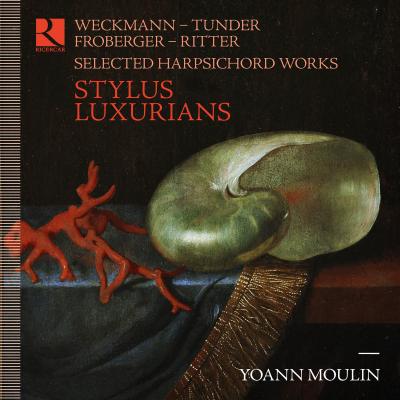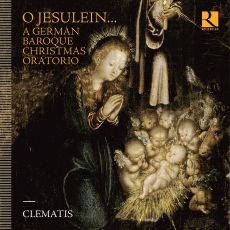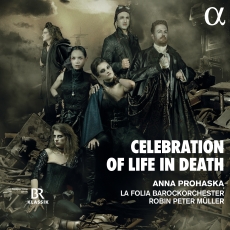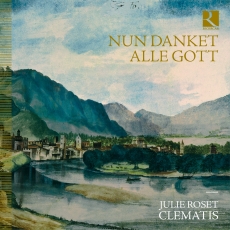Stylus Luxurians
Stylus Luxurians

Choose quality
Studio Master (192) FLAC
- Studio Master (192) ALAC
- Studio Master FLAC
- Studio Master ALAC
- CD Quality FLAC
- CD Quality ALAC
- MP3
- Toccata in E MinorComposer(s) Matthias WeckmannArtist(s) Yoann Moulin
Toccata in E Minor
03:35$2.30 - Canzon in D MinorComposer(s) Matthias WeckmannArtist(s) Yoann Moulin
Canzon in D Minor
03:02$2.30 - Partita in B Minor: I. PraeludiumComposer(s) Matthias WeckmannArtist(s) Yoann Moulin
Partita in B Minor: I. Praeludium
01:04$2.30 - Partita in B Minor: II. AllemandaComposer(s) Matthias WeckmannArtist(s) Yoann Moulin
Partita in B Minor: II. Allemanda
02:57$2.30 - Partita in B Minor: III. CouranteComposer(s) Matthias WeckmannArtist(s) Yoann Moulin
Partita in B Minor: III. Courante
01:27$2.30 - Partita in B Minor: IV. SarabandComposer(s) Matthias WeckmannArtist(s) Yoann Moulin
Partita in B Minor: IV. Saraband
02:14$2.30 - Partita in B Minor: V. GigueComposer(s) Matthias WeckmannArtist(s) Yoann Moulin
Partita in B Minor: V. Gigue
02:11$2.30 - Benedicam DominoComposer(s) Heinrich ScheidemannArtist(s) Yoann Moulin
Benedicam Domino
06:01$2.30 - Toccata vel Praeludium in D MinorComposer(s) Matthias WeckmannArtist(s) Yoann Moulin
Toccata vel Praeludium in D Minor
02:48$2.30 - Praeludium in G MinorComposer(s) Franz TunderArtist(s) Yoann Moulin
Praeludium in G Minor
03:15$2.30 - Canzon in C MinorComposer(s) Matthias WeckmannArtist(s) Yoann Moulin
Canzon in C Minor
04:36$2.30 - Ricercare XI in D MinorComposer(s) Johann Jacob FrobergerArtist(s) Yoann Moulin
Ricercare XI in D Minor
03:26$2.30 - Toccata in D MinorComposer(s) Matthias WeckmannArtist(s) Yoann Moulin
Toccata in D Minor
03:26$2.30 - Suite in C Minor: I. AllemandaComposer(s) Christian RitterArtist(s) Yoann Moulin
Suite in C Minor: I. Allemanda
05:43$2.30 - Suite in C Minor: II. CourandeComposer(s) Christian RitterArtist(s) Yoann Moulin
Suite in C Minor: II. Courande
01:47$2.30 - Suite in C Minor: III. SarabandaComposer(s) Christian RitterArtist(s) Yoann Moulin
Suite in C Minor: III. Sarabanda
02:24$2.30 - Suite in C Minor: IV. GiqueComposer(s) Christian RitterArtist(s) Yoann Moulin
Suite in C Minor: IV. Gique
02:06$2.30 - Sonatina in D MinorComposer(s) Christian RitterArtist(s) Yoann Moulin
Sonatina in D Minor
04:17$2.30
Total running time: 56 minutes.

Album information
For this second part of his anthology of seventeenth-century German harpsichord music, Yoann Moulin takes as his starting point the famous competition organised when Weckmann and Froberger met at the court of Dresden.
It was in the 1650s that the influences of the French style were grafted onto models drawn from Italian music. The compositions of this period are presented to us in their infinite variety.
Yoann Mouline writes: "Stylus luxurians ”A ricercar has something in common with the speed of an equation” The creation of movement. A first gesture, a first sense, a first direction, is opposed and countered. Energy redirected, non-linear, unpredictable and irregular. Baroque. After the almost logical forms of his masters — canons and fugues, ordered and comprehensive variations — Matthias Weckmann set down a path that followed the aesthetic upheavals, the new ideas, and the events that marked his age. Music for troubled times, fantastical and strange. Music for the wars of religion, the Thirty Years’ war and longer. Music for conflict, that stood between beauty and ugliness, proportion and disproportion, reason and madness. Weckmann created and then destroyed; structures were raised only to be reworked, corrupted and finally shattered. All gestures were exaggerated. The stylus luxurians was known for its use of much dissonance and for musical figures that could not only move the listener but were also in the greatest possible accord with the text. Religious movements, reformed or not, attempted to attract followers with music that was less abstractedly celestial but had a greater connection to the flesh and to carnality. It possessed a vibrancy that could arouse the emotions of the faithful, a sensual rhetoric that no longer symbolised divinity but instead spoke to human emotions, that could explain and encourage the soul’s mystical love for God in sound. Weckmann seized upon this declamatory art, Frescobaldi’s ‘madrigal without words’, and here portrayed the soul’s passions, absurdities, and contradictions."



